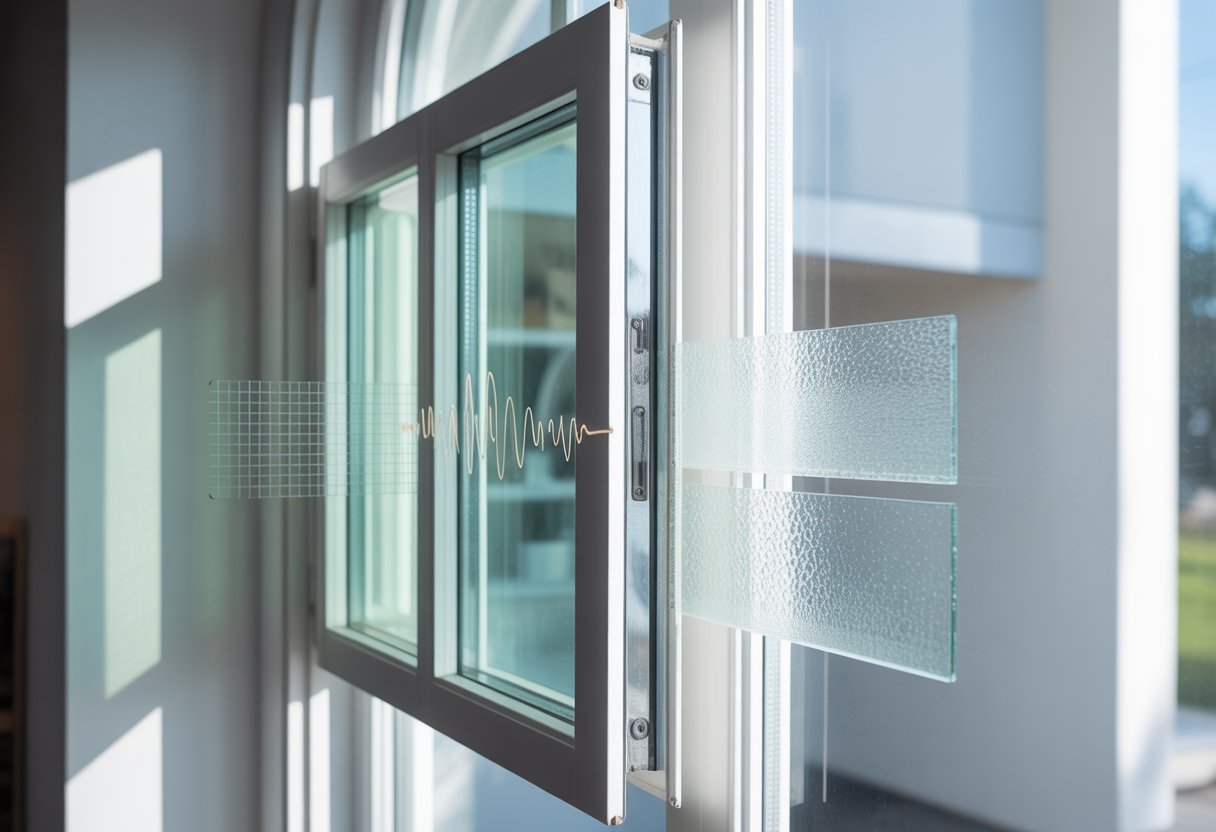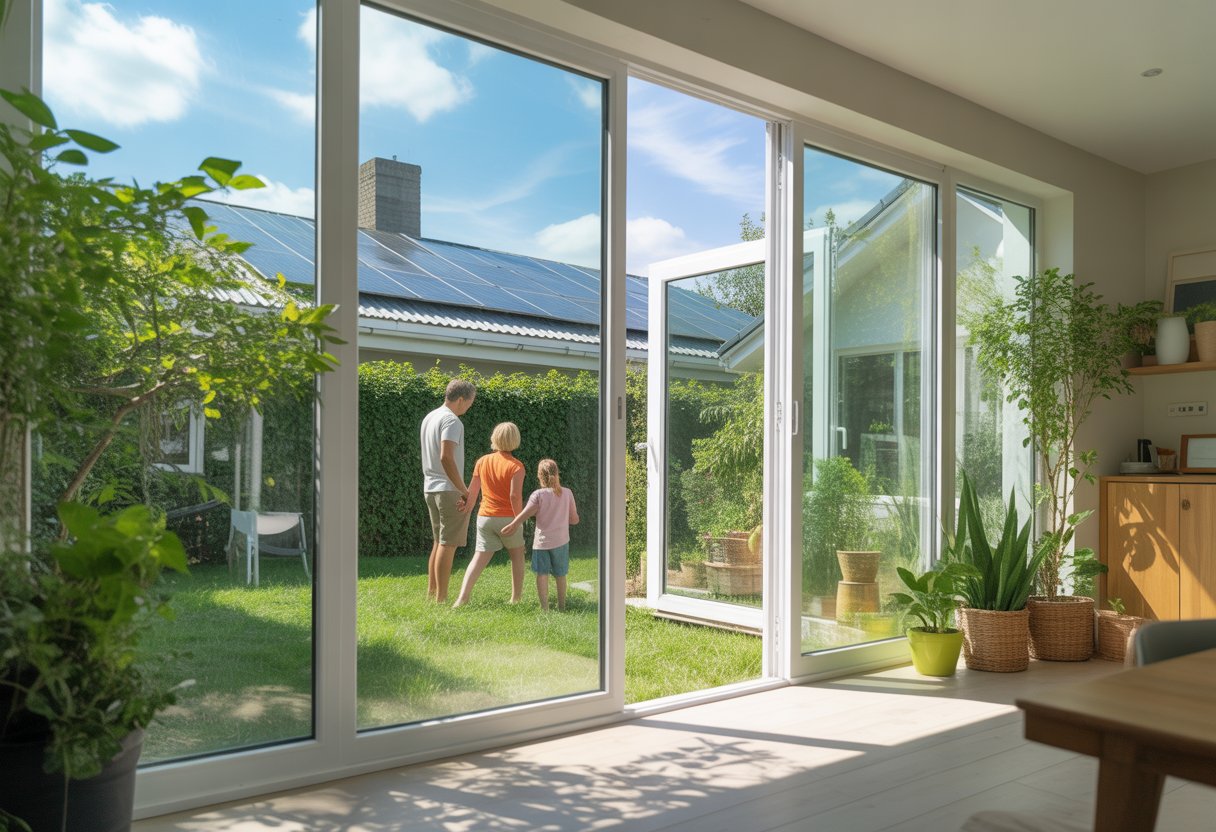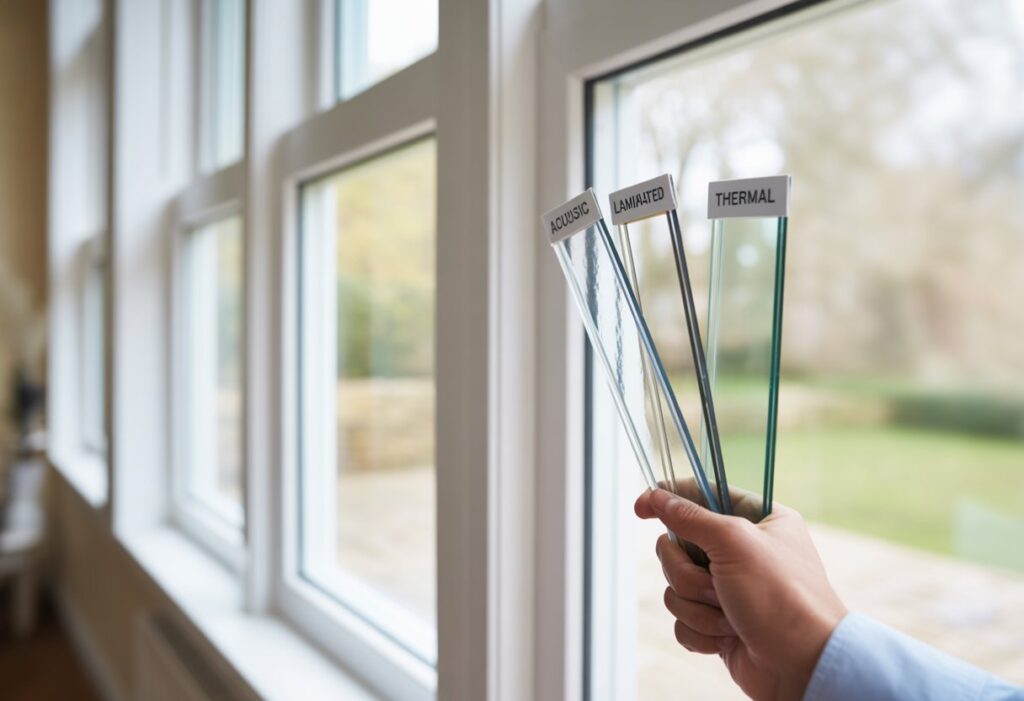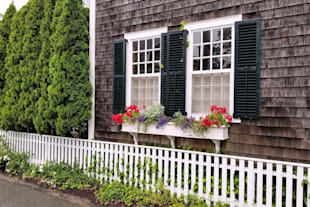Choosing the right glass for sash windows is important for comfort, noise control, and energy savings. Homeowners can select from acoustic, laminated, or thermal glass, each offering specific benefits. Acoustic glass is best for reducing outside noise, while laminated glass improves safety and adds some noise protection, and thermal glass helps keep homes warmer and more energy efficient.

Knowing the differences makes it easier to match the glass type to any home’s main needs. With the right choice, sash windows can look good, last longer, and make living spaces quieter and more comfortable.
Understanding Glass Options for Sash Windows

When choosing glass for sash windows, key factors include noise reduction, energy savings, and security. Each glass type offers unique benefits for different needs and living environments.
Laminated Glass Explained
Laminated glass is made by bonding two or more glass layers together with a plastic interlayer. This design improves safety and security, as the glass holds together if broken.
It is much harder to break through laminated glass compared to standard glass. This provides extra protection against break-ins.
Laminated glass also helps block more UV rays, which can protect furnishings from fading. Because of its layered structure, it can improve sound insulation, although it is not always as effective as fully acoustic glass.
Installation of laminated glass is typically straightforward for professionals. It is often chosen for homes where both security and basic noise reduction are priorities.
| Feature | Laminated Glass |
|---|---|
| Safety | High |
| Security | Enhanced |
| Noise Reduction | Moderate |
| Cost | Mid-range |
What Is Acoustic Glass?
Acoustic glass is designed specifically to reduce noise pollution. It is usually made by using laminated glass with a special sound-dampening layer.
This glass can lower external noise by up to 40 decibels, making homes much quieter even in busy areas or near traffic. Acoustic glass is popular in cities or near airports.
Unlike basic laminated glass, acoustic glass targets sound insulation as its main goal. It is slightly thicker and heavier than standard glass.
People living in loud environments often choose acoustic glass to improve comfort. It enhances privacy and can help create a peaceful atmosphere indoors.
| Benefit | Acoustic Glass |
|---|---|
| Sound Insulation | Strong |
| Typical Use | Busy/urban locations |
| Thickness | Greater than standard glass |
Thermal Glass and Energy Efficiency
Thermal glass, such as double-glazing or triple-glazing, focuses on improving energy efficiency. It consists of two or more panes separated by a space filled with air or inert gas, which helps slow heat transfer.
Windows with thermal glass keep heat in during winter and block heat in the summer. This can reduce heating costs and improve comfort all year.
Good thermal performance is measured by the U-value. Lower U-values mean better insulation. Modern energy-efficient windows have U-values much lower than older, single-pane windows.
Thermal glass also reduces condensation and helps reduce the environmental impact of heating and cooling a home. Although it can cost more upfront, it can lead to long-term savings on energy bills.
Key thermal glass features:
- Helps cut down on heat loss
- Improves energy efficiency
- Saves money on heating and cooling
Comparing Toughened and Standard Glass
Toughened glass is also called tempered glass. It is heated and cooled quickly during production to make it much stronger than standard glass.
If toughened glass breaks, it shatters into small, blunt pieces, which are less likely to cause injury. It is often used in areas where safety is a concern, such as low-level windows or doors.
Standard glass, on the other hand, breaks more easily and can form sharp shards. While it is cheaper, it does not offer extra safety or security.
Toughened glass has improved resistance to impacts but does not usually add much sound or thermal insulation. It is often recommended where regulations require safety glass installation.
| Glass Type | Strength | Safety | Use Case |
|---|---|---|---|
| Toughened Glass | Very High | Blunt pieces | Safety-critical areas |
| Standard Glass | Low | Sharp shards | Basic glazing situations |
Performance Factors to Consider

Different types of sash window glass offer unique benefits in noise reduction, energy efficiency, and safety. Selecting the right glass can make a significant impact on daily comfort, bills, and home security.
Noise Reduction and Acoustic Comfort
Noise pollution from busy streets, traffic, or neighbours can disturb peace at home. Acoustic glass is built to limit sound transmission through windows, which can improve everyday comfort. It uses a special laminated layer that blocks and absorbs sound waves.
The thickness and composition of the glass play a big role. For example, thicker panes or laminated acoustic glass can reduce noise by up to 35 decibels. Acoustic sash windows may be heavier, so strong frames are needed to support the extra weight.
Benefits of acoustic glass for sash windows:
- Lower outdoor noise inside
- Improved sleep and relaxation
- More privacy from outside sounds
Thermal Insulation and Energy Savings
Thermal performance is key to keeping homes warm in winter and cool in summer. Modern window glass can include special coatings or multiple panes to improve energy efficiency. Low U-values mean less heat escapes, helping to maintain a steady room temperature.
Double glazing and thermal glass cut down on heating costs and make homes more eco-friendly. Over time, these windows can lead to cost savings on energy bills. Energy-efficient glass also helps to reduce condensation and draughts.
Important features for thermal insulation:
| Type | U-Value (approx.) | Benefit |
|---|---|---|
| Single Glazing | 5.0 | Basic insulation |
| Double Glazing | 1.2 – 3.0 | Improved efficiency |
| Laminated Thermal | 1.0 – 1.6 | Best performance |
Safety, Security, and Property Value
Laminated glass is a popular choice for safety and security. It has a plastic interlayer that keeps the glass together if broken, making it safer than standard float glass. This lowers the risk of injury during accidents and makes forced entry harder.
Safety glass installation can deter burglars and prevent glass from shattering easily. Choosing the right glass can also increase a home’s value. Many buyers seek secure and energy-efficient windows, which enhance the property’s appeal.
Key safety and value features include:
- Stronger resistance to impact
- Added protection for families and pets
- Potential to boost resale value
Specialist Glazing Types and Applications
There are many specialist glazing options for sash windows, each designed for specific needs. Some focus on energy efficiency or noise reduction, while others address emergency repairs, safety, or aesthetics.
Triple and Double Glazing Advancements
Modern double-glazed units use two panes of glass separated by a gap filled with air or inert gas. This design improves insulation, lowering heat loss and helping achieve better U-values. Lower U-values mean windows are more energy efficient.
Triple glazing adds a third pane and another gas layer, offering even lower U-values and better sound insulation. This can be especially useful in very cold climates or noisy areas. Replacing older, single-pane sash windows with double or triple glazing can reduce energy bills and make a noticeable difference in comfort.
Sometimes, misted double glazed units need to be replaced due to condensation between panes. Most installers can replace just the glass or the whole unit, depending on the condition of the frame.
Emergency, Roof, and Site Glazing Solutions
Emergency glazing offers fast solutions if glass breaks due to accidents, weather, or crime. Companies provide boarding-up services to secure a property while organising replacement glass.
Roof glazing uses special glass designed to withstand heavy rain, wind, and more direct sunlight. This glass is often toughened or laminated for extra strength and safety.
Site glazing means repairs or installation are done directly at the property after measurements or when special fitting is required. Systems glazing refers to glazing methods used for larger projects like commercial buildings where many windows need to be installed in a specific order. These services are planned for minimal disruption and maximum safety.
Decorative and Functional Customisations
There are many ways to customise glazed sash windows for both aesthetics and function. Decorative glass, such as stained, frosted, or patterned types, can add style or privacy. Leadlight repairs restore original designs in period properties.
Window filming can further improve safety, privacy, or solar control. Mirror installation and custom-cut glass are options for unique interiors. Clients can select from a range of thicknesses, tints, and coatings to match the design and performance they require.
The following table outlines some common customisation options:
| Option | Purpose/Benefit |
|---|---|
| Stained/Patterned Glass | Aesthetic enhancement |
| Window Filming | Privacy, UV reduction |
| Laminated Safety Glass | Improved security |
| Custom Tints/Coatings | Solar control, insulation |
Installation and Maintenance Considerations
Proper installation methods and regular maintenance are important for keeping sash windows secure and energy-efficient. The quality of both greatly affects how well the window glass performs, from sealing out noise to providing insulation.
Professional vs DIY Installation
Professional installation is recommended for most sash windows, especially when fitting acoustic, laminated, or thermal glass. Installers use specialised tools and proven sealing methods to ensure a perfect fit.
They check frame suitability, which is important, as acoustic glass can be heavier and requires sturdy frames. Professionals can often provide a warranty on their workmanship and materials. Some companies may even offer a free quote before starting the work.
DIY installation might seem cost-effective, but it can lead to issues like poor sealing, draughts, or even breakage. Without the right skills and equipment, it’s easy to damage the frame or glass. Warranties usually do not cover problems from DIY installation, leading to higher repair costs over time.
Ongoing Care and Window Repairs
Sash windows need regular maintenance to stay in top shape. It’s important to check the seals and tracks for dirt or damage, as this can affect both comfort and energy savings.
For broken or chipped glass, glass repairs should be carried out swiftly to restore security and prevent further damage. If the issue lies elsewhere, such as in the frame or sash, a specialist in sash window repairs should assess and fix the problem.
Double glazing repairs and affordable glazing services are widely available and can help extend the window’s lifespan. Keeping moving parts clean and well-oiled also helps prevent sticking or rattling, reducing the risk of costly repairs later on.
Sustainability, Compliance, and Final Selection
Choosing glass for sash windows affects both property performance and responsibilities as an owner. Environmental impact, legal compliance, and matching solutions to specific needs all play a vital role in the decision-making process.
Environmental Considerations and Indoor Quality
Sustainable sash window choices help lower the energy consumption of a property. Glass types like acoustic laminated and thermal glass support better insulation, which reduces heating demand. Double- or triple-glazed units can also cut down on draughts when combined with proper draught proofing.
Good indoor air quality depends on controlling moisture and thermal retention. High-quality, well-fitted glass prevents cold spots and condensation, which can help avoid mould growth. Modern glass options often use materials and coatings that are low-emission and safer for indoor air.
For refurbishments, choosing sustainable glass can also mean less waste, especially when sash windows are restored rather than replaced. Many commercial properties now select energy-efficient glass to meet CSR or green building guidelines.
Regulatory Requirements and Safety Standards
All new sash window installations and refurbishments in the UK must follow current Building Regulations. Glass must meet specific energy-efficiency ratings (such as minimum U-values) and safety standards, especially in door installations or windows close to the ground.
Laminated and toughened glass provide extra security and safety by reducing the risk of break-ins and injury from breakage. Compliance is checked during refurbishment projects and is essential for both residential and commercial properties.
Certificates of compliance, such as those provided by FENSA or CERTASS, show that glass and installation meet government standards. Properties in conservation areas may need to follow extra rules when upgrading sash windows, which can affect the choice of glass.
Tailoring Glass Choices to Your Property
 Different properties have different needs based on age, location, and use. For older homes, acoustic laminated options can block urban noise while retaining a traditional look. In highly insulated modern builds, thermal glass is often preferred for energy savings.
Different properties have different needs based on age, location, and use. For older homes, acoustic laminated options can block urban noise while retaining a traditional look. In highly insulated modern builds, thermal glass is often preferred for energy savings.
Commercial properties might require glass with enhanced security, higher fire safety ratings, or specific acoustic performance. It is important to balance aesthetics, security, and efficiency.
Property owners should work with experienced suppliers who understand both regulations and the unique demands of sash window refurbishments. Custom solutions ensure compliance, comfort, and sustainability for each setting.

